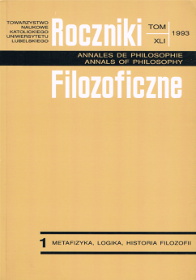The Logical Analysis of the Expression „an a (a certain a)”
Abstract
The notation “σ|a|” is used for the expression “an a (a certain a)”.
In Lesniewski’s ontology the sense of the functor “σ” is determined by the axiom:
ex(a) → σ|a|εa
or by the definition:
b = σ|a| ≡ ex(a)ΛⱯ(a ⸦ c → bεc)V ~ ex(a)Λ b = Λ
c
By virtue of this definition we can prove the following theses:
ex(a) → Ɐ(a ⸦ c → σ|a|εc
c
ex(a) → σ|a|εa
~ ex(a) → σ|a| = Λ
aeV → σ|a| = a
σ|Λ| = Λ
ex(a) → σ|σ|a|| = σ|a|
σ|σ|A|| = σ|Λ|
If a is an individual or empty name then — by virtue of the theses 4, 5 — the denotations of the expressions “σ|a|”, “a” are identical. Hence, for pragmatical reasons we do not precede such names by the functor “σ”.
We do not use the iterations of the sign “σ”, treating such iterations as superfluous, since — by virtue of the theses 6, 7 — the denotations of the expressions “σ|σ|a||” , “σ|a|” are identical.
Copyright (c) 1993 Roczniki Filozoficzne

This work is licensed under a Creative Commons Attribution-NonCommercial-NoDerivatives 4.0 International License.





